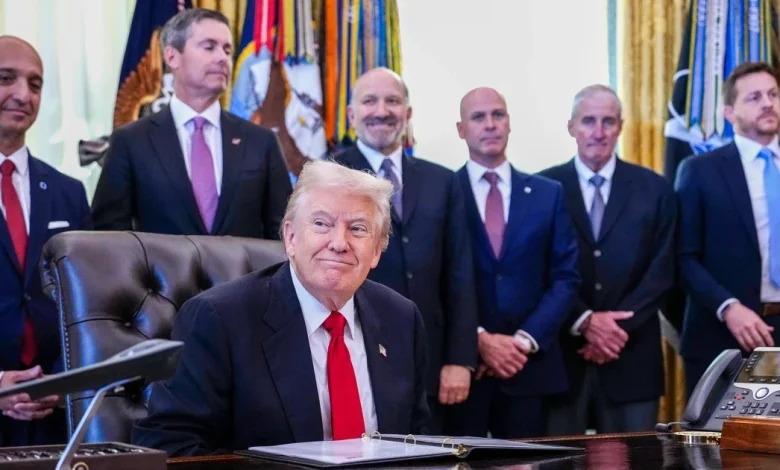Trump’s weight loss drug deal promises big savings — but some details are murky

President Donald Trump hailed his deal to slash the price of blockbuster weight loss drugs as a game changer, promising to make Wegovy and Zepbound more affordable for millions of Americans.
But major gaps in the plan could blunt its impact, drug policy experts say: Some of the drugs the administration has promised discounts on haven’t been approved yet by the Food and Drug Administration; the lower prices for people paying out of pocket only appear to apply to the lowest doses of the drugs; and the deal doesn’t expand Medicare coverage to people seeking treatment for weight loss alone.
“It’s a situation where we have more questions than answers,” said Juliette Cubanski, deputy director of the Medicare policy program at KFF, a nonpartisan health policy research group. “Based on what we didn’t hear, that suggests to me that there’s a lot that the administration itself hasn’t even ironed out as of yet.”
“It just feels,” she added, “a little bit too squishy right now.”
U.S. President Donald Trump, joined by members of the pharmaceutical industry and administration officials, delivers remarks on lowering drug prices in the Oval Office at the White House on November 06, 2025 in Washington, DC. Andrew Harnik / Getty Images
The announcement marks one of the most ambitious efforts yet to tackle the high cost of weight loss drugs in the U.S. Wegovy and Zepbound carry list prices above $1,000 a month, a cost that both Republicans and Democrats have criticized as far too high, especially compared with what other countries pay.
Administration officials say there’s still time to iron out details before the lower prices take effect. The lower prices that will be available through the administration’s self-pay platform, TrumpRx, aren’t expected to go live until the end of the year, and the Medicare and Medicaid changes won’t roll out until mid-2026.
“I think the administration deserves credit for continuing to try to push the envelope on finding ways to lower prescription drug prices in the U.S.,” Cubanski said. She said KFF polling shows that health care costs, including prescription drugs, are a top concern for Americans.
Art Caplan, the head of the division of medical ethics at NYU Grossman School of Medicine in New York City, said the deal, while ambitious, lacks crucial details.
“It’s just murky as to how this will take shape, how the programs will work,” Caplan said. “You can’t really tell from what’s going on.”
Unapproved drugs
Several forms of the drugs included in the deal haven’t yet received FDA approval. That includes oral versions of the weight loss drugs — which are still under development or FDA review — and Eli Lilly’s new multidose injection pens, which haven’t been approved but the drugmaker says are the versions included in the pricing agreement.
Lawrence Gostin, director of the O’Neill Institute for National and Global Health Law at Georgetown University, said that makes the administration’s promises premature, since those lower prices can’t take effect until the products are on the market.
“It is reckless to negotiate pricing deals on products which the FDA have not yet approved as safe and effective,” Gostin said. “The administration is getting way out ahead of its own safety agency.”
An oral version of Wegovy, from Novo Nordisk, is being reviewed by the FDA. A decision is expected in the coming weeks.
A multidose version of Zepbound is under review by the FDA, Lilly said. The company hasn’t submitted its weight loss pill, orforglipron, to the agency yet.
Lilly CEO David Ricks told NBC News’ Tom Llamas on “Top Story” that the FDA would review the pill quickly. “As part of the deal, they’ve agreed to give us an expedited approval,” Ricks said.
Different doses, different prices
The White House said that both the pills and the injection pens will be available for discounted prices for people who pay out of pocket.
Starting doses of weight loss pills will cost $149 for a month’s supply, and the shots will cost an average of $350 for a month’s supply, the White House said. The price of the injections is expected to fall to about $250 within two years, it said.
But people may end up paying more.
When people start on a weight loss drug, they start with the lowest dose possible — the starting dose — to allow the body to get used to the drug. Over the course of several months, however, they increase the dose until they get to a dose that’s effective for weight loss. Wegovy comes in five doses and Zepbound comes in six, with the most weight loss seen at the highest doses.
Administration officials said the starting doses of GLP-1 pills will cost $149 a month, but did not say what higher doses would be.
For the injections, the exact White House language was vague: The shots will initially have a “weighted average” price of $350 a month. Lilly, however, said Zepbound will be available at the lowest dose for $299 a month, with additional doses priced up to $449. A spokesperson for Novo Nordisk didn’t say whether doses would have different prices, but said it plans to publish an update on costs “in the coming weeks.”
That means patients paying through TrumpRx could end up paying far more than the administration’s advertised prices — especially if patients don’t stay on the lowest doses for long, Caplan said.
Limited coverage
As part of the deal, Lilly and Novo Nordisk will charge Medicare and Medicaid $245 for a month’s supply of the shots, a move that will likely provide savings for the programs. Medicare enrollees will have their costs capped at $50 a month. Medicaid enrollees often don’t have copays.
But not everyone on Medicare or Medicaid is eligible.
Under the deal, Medicare will continue to cover the weight loss drugs for people who are overweight or obese and have another qualifying condition, such as heart or kidney disease. The agreement doesn’t expand coverage to people using the drugs for weight loss alone. Medicare, by law, is barred from covering weight loss drugs, Cubanski, of KFF, said.
The lack of expanded coverage is a significant omission, said Stacie Dusetzina, a health policy professor at Vanderbilt University in Nashville, Tennessee.
Medicare is one of the largest payers in the country, and without broader coverage, millions of patients will remain priced out even as the administration touts lower costs.
“You would have to change the law or go through several regulatory steps to be able to offer coverage outside of an already covered indication,” Dusetzina said.
A White House spokesperson said the administration wanted to first lower prices for patients who would most benefit, such as those with risk factors associated with obesity.
It’s possible the administration could eventually expand Medicare coverage through a pilot program. Ricks, the CEO of Lilly, said at a briefing Thursday that the government plans to launch one in spring 2026 that would be voluntary for Medicare plans.
Still, there are issues Medicare plans would have to weigh, Dusetzina said.
“The plans will have to think about how many more people might be interested in enrolling and using these drugs and how that would affect their costs,” she said. “So, again, it’s not totally clear to me how that will get operationalized and how soon Medicare beneficiaries would expect to see lower prices.”
Ricks said the pilot would be “at no cost” to the plans.
Dr. Shauna Levy, a specialist in obesity medicine and the medical director of the Tulane Weight Loss Center in New Orleans, said the deal is “a step in the right direction” but she worries if the administration is overstating the potential savings.
“As an obesity community, I think we will remain skeptical of this deal until we see how it actually plays out,” Levy wrote in an email.





